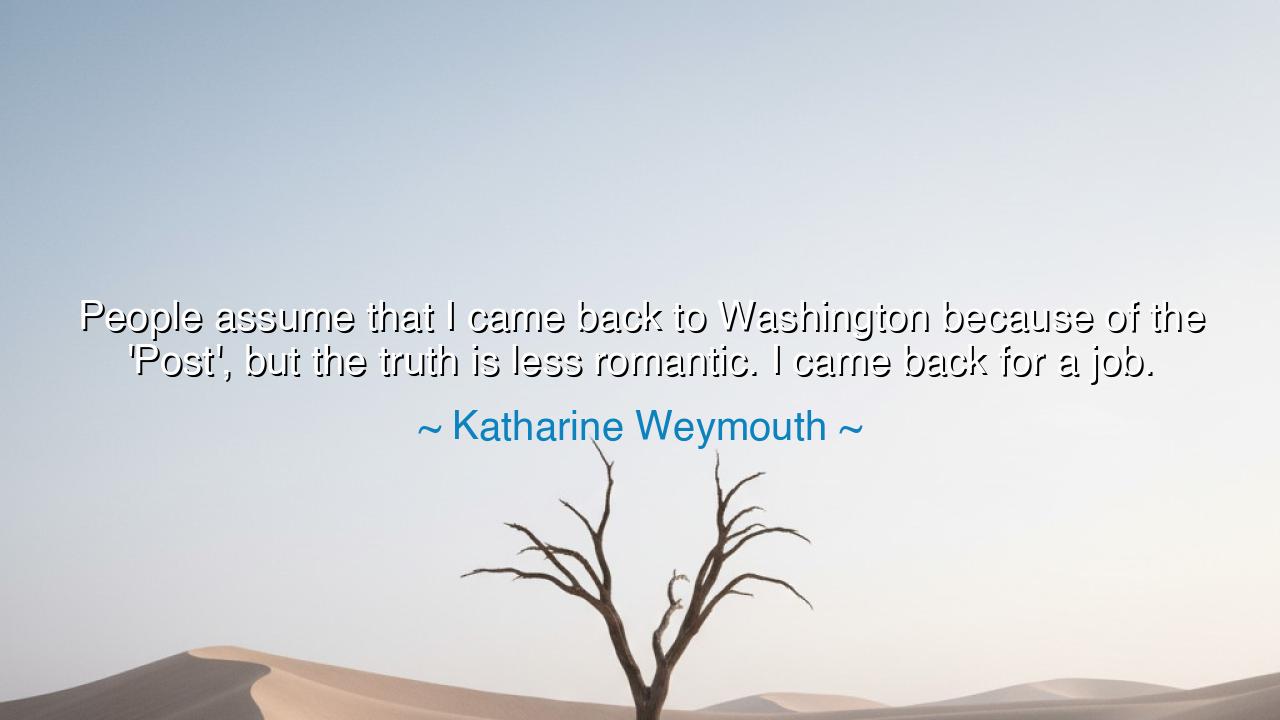
People assume that I came back to Washington because of the
People assume that I came back to Washington because of the 'Post', but the truth is less romantic. I came back for a job.






"People assume that I came back to Washington because of the 'Post,' but the truth is less romantic. I came back for a job." These words by Katharine Weymouth lay bare a fundamental truth about the nature of human action. While the world often romanticizes decisions and motivations, the truth is frequently much simpler, rooted in the practical and the mundane. Weymouth acknowledges that the allure of romanticized narratives—those that suggest actions are driven by lofty ideals or grand destinies—is often far from reality. Instead, her decision to return to Washington was driven by the practical need for a job, a more grounded and relatable reason than the idealized stories we often tell ourselves about others.
In the ancient world, such notions would have been recognized as part of the human condition. The Greeks and Romans were no strangers to the stories of gods and heroes whose actions were often dictated by forces beyond human control—by fate, divine will, or noble pursuit. The Aeneid, for example, recounts the journey of Aeneas, whose destiny, dictated by the gods, was to found the city of Rome. His motivations, while mixed with duty and sacrifice, were often framed within the larger narrative of heroism and divine intervention. Yet, even the gods in their wisdom understood that human beings—while capable of great nobility—were also driven by the necessities of life: the need for sustenance, shelter, and purpose. In the simplest terms, Aeneas's quest was driven by the very need for survival, something far less romantic than the mythic grandeur we often attribute to such tales.
Weymouth’s admission cuts through the layers of romanticized narratives that often obscure our true motivations. Her pragmatism is a reminder that, despite our desire to elevate our actions, many decisions in life are driven by practical considerations—the need to earn a living, to fulfill responsibilities, and to ensure personal stability. This is not to diminish the significance of those decisions, but rather to place them within the context of real life, where ambition and survival are often intertwined. In this, Weymouth invites us to reflect on the balance between ambition and necessity, and the ways in which the mundane aspects of life shape our larger narratives.
Consider the example of Socrates, who, though a great philosopher and seeker of wisdom, did not live a life of luxury or romance. Socrates did not become the intellectual giant he is remembered as because he sought glory or fame—in fact, he rejected these in favor of living a simple, often austere life. Instead, his actions were driven by his mission to question and understand, and much of this was rooted in the practical need to engage in discourse and to challenge his society’s values. Socrates’ quest for truth was as much about surviving the intellectual climate of his time as it was about any divine calling. In this, Socrates shows us that even the most romanticized journeys, those of the philosopher or the poet, are often driven by practical motivations at their core.
By rejecting the romantic narrative surrounding her return to Washington, Weymouth challenges us to reconsider our own motivations. Why do we pursue the things we do? Is it for the glory of achieving something larger than ourselves, or is it, perhaps, to fulfill a more pragmatic need? Are we driven by the dream of becoming a hero, or by the simple, human need to secure our place in the world? The lesson here is powerful: truth is often more humble than we imagine, and greatness can arise from the most practical and ordinary of actions.
As we navigate our own lives, let us not fall into the trap of creating romanticized narratives around our decisions. Let us embrace reality, understanding that our choices, even those that seem mundane, are shaped by the same forces that drive the most heroic actions in history. There is honor in providing for oneself, in securing a future, and in making decisions that might not be grand but are essential for growth and survival. By honoring the practical aspects of life, we recognize that even the most ordinary of decisions can lead to extraordinary outcomes. Let us, like Weymouth, make decisions that are both practical and meaningful, rooted in our needs but also in our vision for the future.
In the end, truth—like the decisions we make—is often less romantic than we expect. But it is in accepting and embracing this reality that we can move forward with clarity, purpose, and strength, building a life that is grounded in the real, the necessary, and the true.






AAdministratorAdministrator
Welcome, honored guests. Please leave a comment, we will respond soon